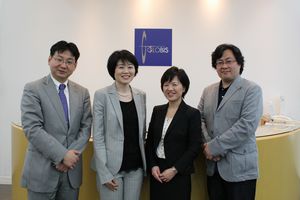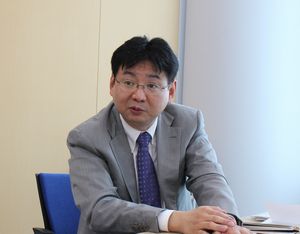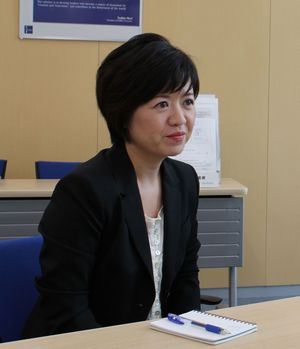-
Conversations with People and Topics of Focus
Striving to Become the No.1 Business School in Asia: Graduate School of Management, GLOBIS University
The expression “global human resources” has become commonplace in recent years. Today, not only corporations but also educational institutions, such as universities, promote the cultivation of global leaders.
In this issue, our guests are Tomoya Nakamura and Megumi Taoka of the Graduate School of Management, GLOBIS University. With the aim of becoming the No. 1 business school in Asia, GLOBIS University has been ahead of its peers in focusing on the development of global human resources since its opening in 1992. Last year, the university launched a full-time MBA program fully carried out in English.
We asked Mr. Nakamura and Ms. Taoka about the momentum building at GLOBIS—what do they have their sights set on at the current time?
【Profile】Tomoya Nakamura
Dean, Graduate School of Management, GLOBIS University (English MBA Program)
Received a BA in Social Sciences from Hitotsubashi University and an MBA from Harvard Business School. Worked for Marubeni Corporation, and was involved in investment-related affairs in Advantage Partners’ reorganization of Fuji Machinery Mfg. & Electronics Co. Ltd. after its bankruptcy.
Megumi Taoka
Manager, Faculty Content Office, Graduate School of Management, GLOBIS University (English MBA Program)
Received a BA in Philosophy at Keio University and an MBA from the University of Tsukuba Graduate School of Business Sciences. While in New York and London, was engaged in financial reporting for apparel and entertainment licensing businesses.Mariko Ohsato
Arc Communications CEO & President
Yoshihiro SatoWeb Executive Manager, Arc CommunicationsNakamura Ohsato Taoka Sato
A Full-Time MBA Program in English—The Objective Since Day 1
Ohsato:Last year, The Graduate School of Management, GLOBIS University established a full-time, all-English MBA program. I get the impression that you have made a full-scale launch of your globalization efforts. Can you tell us more about the ins and outs of this development?
Nakamura:We have always aimed to become the No. 1 business school in Asia. Ever since the school opened, we had felt that a program in English was required in order to achieve this aim. After all, offering classes only in Japanese limited our reach to the national market. We gradually expanded the range of the classes conducted in English, starting in 2006 with classes in English offered “à la carte,” then progressing in 2009 to a part-time MBA program carried out in English on weeknights, and finally to the current full-time English MBA program in 2012. By launching the full-time English MBA program, we established cooperative relations with 36 large corporations and multi-national companies in relation to the nurturing of global human resources.
Ohsato:It seems to also have brought about a globalization of GLOBIS itself. I heard there are now a wide variety of students from different backgrounds and nationalities. Do you have in mind a target of students from any particular country?
Nakamura:The 23 students of Year One came from various countries, with a focus of students from Asian nations such as Indonesia, Malaysia, the Philippines and Thailand. American business schools teach about business in America only. We emphasize that taking MBA classes in Japan, an Asian nation, would prove more useful to those who are planning to play an active role in business that involves Japanese or Asian markets.
Taoka:When you go overseas, you realize how much trust and anticipation are directed towards Japan—much more than you may have imagined while in Japan. We have a very good reputation on many levels, such as being the best business school in Japan, having company executives from top Japanese firms as lecturers, having hospitable staff members, and providing swift support. Some were surprised to find actual lecturers coming to see them in person. After all, most schools only dispatch sales representatives. Japan is still a strong name abroad. Students are excited about having an opportunity to learn the secrets behind the success and high-ranking of Japanese companies on the global market. We strongly feel that there is an advantage to learning in Japan because not only management strategies but also cultural elements, such as the spirit of abiding by the rules, contribute to Japan’s success.
Nakamura:Mr. Hori (Yoshito Hori, President of GLOBIS) also held seminars abroad for the recruitment of students. It seems to have helped students develop dreams about their future—that perhaps they may be able to become entrepreneurs like Mr. Hori if they study at GLOBIS.
Sato:From the students’ point of view, studying in Japan itself is the crucial factor. Listening to them, we could clearly understand their desire to experience the power of successful Japanese companies firsthand. If you think from a sales perspective, you might think that it would be easier for us to get students if we opened schools abroad, but that isn’t the case.

Nakamura:Exactly. When thinking about globalization, some people think that it would be more advantageous to open schools abroad, in Singapore for example. However, learning in a Japanese environment is a big part of the appeal for foreign students. Therefore, in our global educational services, we emphasize the advantages of studying in Japan. There is recognition that by studying in Japan, much can be learned outside of the classroom—things such as the Japanese spirit, the social contribution made through the business, and so on.
Taoka:We also want to emphasize how high women’s aspirations are in Asia. At GLOBIS, 40% of the international students are women. This is quite a remarkable figure considering that in business schools, women usually account for only about 30% of the student body, even in Western business schools. In Japan, it is said that a high ratio of talented women find work at foreign-affiliated companies in Japan. We can expect an even greater increase in the number of women working in a global environment in the next ten or twenty years. In Thailand, we are told that women already account for 60% of managers. We would like to hold workshops abroad and actively recruit Asian women to our program.
Nakamura: Women are indeed tougher than people think.
Creative English Translation Greatly Affects the Quality of our Program

Ohsato: I believe that controlling the quality of the English program is of the utmost priority in order to ensure that students from around the world will continue coming to your program. How are you dealing with this?
Nakamura:GLOBIS is characterized by the “high level of student satisfaction,” “having only lecturers who have business experience,” its “creation and innovation,” and “high aspirations.” Firstly, the satisfaction level of students is very high. We’re the only school that guarantees a refund for students who did not find the program satisfactory. That’s how much we care about the quality of our programs. Secondly, we have student evaluate the lecturers. We don’t employ someone to serve as a lecturer unless he or she has adequate business experience and is passionate about teaching. Thirdly, “creation and innovation” refers to starting a business from scratch or transforming a major corporation. Lastly, our aspiration is to help every single student find their objective in life.
Sato:Considering that you strongly emphasize the advantages of studying in Japan, it must also be important to convey the uniqueness and specialty of your program. In that sense, I think the quality of your teaching materials must be called into question, too. What are you especially careful about when creating your English teaching materials?
Taoka:We make sure to focus on the case studies of Japan companies. We bring forth advantages that are unique to a Japanese school, for instance by covering the cases of difficulties experienced by Japanese companies when trying to expand their businesses abroad. That’s exactly what we think the appeal of learning in Japan is. Part of this lies in the ways of thinking that are specific to Japan or Asia, and the quality of the English is crucial in order to get these ideas across to international students and we devote a lot of attention to this. When we were providing Japanese students with English programs, it was all right so long as the grammar was correct because they already understood the culture. However, in order to provide a high-quality program for people from different countries, more natural and persuasive English was required. In other words, logical and creative English became essential. Arc Communications has helped us with these translations. We’re very grateful.
Ohsato: Indeed. We used to help with translations into Japanese. Now we’re assisting you with translations into English as well. We’re honored to be able to help.
Conveying the Significance of Studying in Japan to Both Japanese and International Students
Sato:You mentioned the enthusiasm of young people in Asia toward studying in Japan. It was a reflection of the energy present in developing nations. Meanwhile, what are GLOBIS’ thoughts regarding the global education of Japanese youths? I think your mission going forward is also to nurture Japanese global leaders.
Nakamura:The education of Japanese youths is indeed a major challenge. At GLOBIS, we adopted a system in which students who take the Japanese-language MBA program can also choose to take up to one third of their classes in English so long as they pass an English proficiency screening.
Taoka:I think that in order to succeed on a global level, logical thinking abilities are required in addition to language skills. When I talk to people from various foreign countries, I find that the order in which they present matters or the way they appeal things differ from person to person. The “Critical Thinking” program is popular at GLOBIS, and, in my opinion, this is precisely the skill required for being able to comprehend matters in a global society.
Nakamura:At GLOBIS, we consider the following six skills to be requirements for global leadership: “business skills,” “conceptual skills,” “human skills,” “English skills,” “global perspective” and “cultural adaptation skills.” The first three are the abilities a leader needs on a domestic as well as global scale. The latter three are abilities that are required if you intend to play an important role on a global level.
Sato:I believe studying in the U.S. is very beneficial for Japanese students, but I would also like to recommend them to take the time to consider your full-time English MBA program. This program should be especially appealing to highly motivated people who want to study again after having entered the workforce.
Nakamura:You’re absolutely right. Both Mr. Hori and I studied at Harvard while Ms. Ohsato, you studied at the Kellogg School of Management. Both are wonderful schools. However, times have changed. Considering family situations, the environment the MBA student will find him/herself in after graduation, the time required and so on, I think that the advantages of acquiring an MBA degree in Japan ought to be appreciated more. In the future, we hope to see Japanese students accounting for 20-30% of the students in the English program.
Ohsato:As you said, I did my MBA at the Kellogg School of Management. While in school, I worried from time to time as to whether my studies would be of use in Japan since I learned exclusively about business in America. In fact, after graduating, as I worked in Japan and China, I sometimes felt that I could not easily apply in my work what I had learned in the stateside MBA program. I think that whether it is someone from Japan or another Asian country, it is extremely beneficial for them to be able to study in Japan, which is close to the environment they will work in after graduation. I look forward to seeing GLOBIS appeal this point even further and serving an even greater role.
Nakamura:I’m currently studying Yangmingism [note: a philosophical school of Neo-Confucianism] with foreign students. It has been very challenging yet fun to translate the concepts into English! (laughs) Students are finding it exciting to debate in a mix of Chinese, Japanese and English.
Taoka:Out of the four characteristics we mentioned earlier, “aspiration” as we define it is an Oriental concept. Students seem to find it very new and refreshing. I hope to also spread the joys of learning the spirit of Japan that goes beyond the business framework, such as “having a goal that you want to eventually achieve” and “thinking about what kind of person you want to become.”
Ohsato:I found listening to you both talk with such enthusiasm about applying good Japanese-style management methods on a global scale and hearing your know-how on the cultivation of global human resources to be very inspiring. I have great expectations for the education of global leaders for the Asian stage. Thank you very much for your time and wonderful conversation.
-
Conversations with People and Topics of Focus
Back Numbers
- Striving to Become the No.1 Business School in Asia: Graduate School of Management, GLOBIS University
- Conversation with a Professional Translator of Business Books (Winter Greeting 2012)
- Abitus thinks ahead, Globalized Human Resources (Summer Greeting 2012)
- The Publishing Platform Business Rolled Out by Six Apart, Ltd. (Winter Greeting 2011)
- The Internal Communication Strategies of Multinational Japanese Companies (Summer Greeting 2011)
- Foreign-language Website Production/Website Translation (Spring Greeting 2011)
- Global/Multilingual Website Solutions (Winter Greeting 2010)
- Market Development through Global Websites (Summer Greeting 2010)

